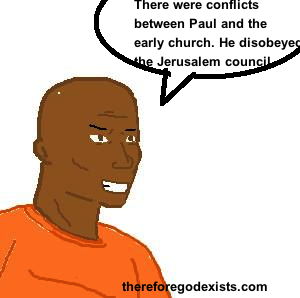 Paul and Muhammad are figures of history around which Christianity and Islam have built their doctrine. Since Paul’s letters compose the majority of the New Testament, he is a central figure of Christianity. He was commissioned by Jesus after the resurrection. His duty was to preach the gospel to the Gentiles. However, Muslims do not hold Paul in high esteem. He is the man who corrupted the pure message of the gospel that Jesus and his disciples left behind. They believe that Paul’s message was corrupt because, they argue, they have a higher authority, namely, the Qur’an. Since the Qur’an was a direct dictation of Allah, and it makes specific claims about Jesus which are contrary to Islamic thought, Muslims propound that Paul must have compromised the message of Jesus and been at odds with the earliest disciples. The question, then is, who gave us the truth about Jesus? In this debate two gentlemen and scholars discussed the topic. This is the Shabir Ally Vs David Wood – Paul Or Muhammad? debate review.
Paul and Muhammad are figures of history around which Christianity and Islam have built their doctrine. Since Paul’s letters compose the majority of the New Testament, he is a central figure of Christianity. He was commissioned by Jesus after the resurrection. His duty was to preach the gospel to the Gentiles. However, Muslims do not hold Paul in high esteem. He is the man who corrupted the pure message of the gospel that Jesus and his disciples left behind. They believe that Paul’s message was corrupt because, they argue, they have a higher authority, namely, the Qur’an. Since the Qur’an was a direct dictation of Allah, and it makes specific claims about Jesus which are contrary to Islamic thought, Muslims propound that Paul must have compromised the message of Jesus and been at odds with the earliest disciples. The question, then is, who gave us the truth about Jesus? In this debate two gentlemen and scholars discussed the topic. This is the Shabir Ally Vs David Wood – Paul Or Muhammad? debate review.
 This was actually broken up into two hour-long debates, the first of which, Dr. Wood had the affirmative, defending the traditional Christian and Pauline interpretation, while Dr. Ally was laboring to undermine Paul’s credibility. In the second debate, Dr. Ally had the affirmative and defending the classical Islamic teaching about Muhammad, that he was, truly, a messenger of God and that he spoke truly about the historical figure, Jesus of Nazareth. Dr. Wood labored to undermine Muhammad’s credibility. Throughout the course of this debate review, I will strive to objectively analyze the arguments and counter-arguments that Dr. Wood and Dr. Ally made, as well as inputting some commentary of my own.
This was actually broken up into two hour-long debates, the first of which, Dr. Wood had the affirmative, defending the traditional Christian and Pauline interpretation, while Dr. Ally was laboring to undermine Paul’s credibility. In the second debate, Dr. Ally had the affirmative and defending the classical Islamic teaching about Muhammad, that he was, truly, a messenger of God and that he spoke truly about the historical figure, Jesus of Nazareth. Dr. Wood labored to undermine Muhammad’s credibility. Throughout the course of this debate review, I will strive to objectively analyze the arguments and counter-arguments that Dr. Wood and Dr. Ally made, as well as inputting some commentary of my own.
 David Wood’s 10 Facts About Paul. In his opening presentation, David Wood listed ten facts about the apostle Paul that seem to vindicate his apostleship. Throughout the course of this debate, Dr. Ally interacted with several of these points, but not all of them. We might graciously grant to Dr. Ally that the reason that he did not interact with all of them was simply a matter of time. But for those points that he did interact with, I will try to represent his responses properly.
David Wood’s 10 Facts About Paul. In his opening presentation, David Wood listed ten facts about the apostle Paul that seem to vindicate his apostleship. Throughout the course of this debate, Dr. Ally interacted with several of these points, but not all of them. We might graciously grant to Dr. Ally that the reason that he did not interact with all of them was simply a matter of time. But for those points that he did interact with, I will try to represent his responses properly.
 Dr. Wood’s ten facts were [1] Paul was a brilliant scholar of the Old Testament, possessing the intellectual fortitude that would be required to make claims about the Messiah. [2] Paul was a contemporary of Jesus. [3] He received revelation from Jesus himself. [4] Paul tested his revelation, submitting it to the authority of the original apostles and found approval. [5] Paul was obsessed with passing on authoritative tradition and he trained all his life to pass on tradition that he received from other men, not that he manufactured. [6] History supports Paul’s view of Jesus. Jesus viewed himself as the Son of God, the Messiah, was crucified and appeared to his disciples. [7] Paul endured vicious persecution for his message. [8] Paul performed numerous miracles, leading his enemies to think that he was possessed with a demon. [9] Paul led a morally exemplary life. [10] The Qur’an promises that Allah would guide the followers of Jesus.
Dr. Wood’s ten facts were [1] Paul was a brilliant scholar of the Old Testament, possessing the intellectual fortitude that would be required to make claims about the Messiah. [2] Paul was a contemporary of Jesus. [3] He received revelation from Jesus himself. [4] Paul tested his revelation, submitting it to the authority of the original apostles and found approval. [5] Paul was obsessed with passing on authoritative tradition and he trained all his life to pass on tradition that he received from other men, not that he manufactured. [6] History supports Paul’s view of Jesus. Jesus viewed himself as the Son of God, the Messiah, was crucified and appeared to his disciples. [7] Paul endured vicious persecution for his message. [8] Paul performed numerous miracles, leading his enemies to think that he was possessed with a demon. [9] Paul led a morally exemplary life. [10] The Qur’an promises that Allah would guide the followers of Jesus.
How did Dr. Ally interact with these point? The Shabir Ally Vs David Wood – Paul or Muhammad? debate review will proceed by outlining the interaction that these gentlemen had.
 Paul received revelation from Jesus Christ. Most Christians are familiar with the conversion story of the apostle Paul. He was a vicious persecutor of the Christian church in the first few chapters of the book of Acts. He even oversaw the martyrdom of the apostle Stephen. But, on his way to Damascus, he encountered the risen Lord Jesus Christ, who commissioned him as an apostle. This led Paul to later write in 1 Corinthians 9:1, “Am I not free? Am I not an apostle? Have I not seen Jesus our Lord?” His testimony as an apostle hinged upon his encounter with Christ.
Paul received revelation from Jesus Christ. Most Christians are familiar with the conversion story of the apostle Paul. He was a vicious persecutor of the Christian church in the first few chapters of the book of Acts. He even oversaw the martyrdom of the apostle Stephen. But, on his way to Damascus, he encountered the risen Lord Jesus Christ, who commissioned him as an apostle. This led Paul to later write in 1 Corinthians 9:1, “Am I not free? Am I not an apostle? Have I not seen Jesus our Lord?” His testimony as an apostle hinged upon his encounter with Christ.
 Dr. Ally contests that Paul never actually encountered Jesus. He suggests that what Paul really encountered was a demon, and this is evident by the fact that there is such a sharp distinction between Paul’s teachings and the teachings of Jesus. However, Paul’s activities as recorded in his letters and the book of Acts could hardly be regarded as demonic. The only thing that Dr. Ally could attribute to demonic activity would be his doctrine, which Christians would argue is consistent with Jesus’ doctrine. Further, at another point during the debate, Dr. Ally seemed to promote what looked like Islamic inclusivism. He argued that God judges people based on how they react to the information that is in front of them. Accordingly, there may be some noblemen who accepted Paul’s teachings and will go to Paradise. But if Paul’s teachings are demonic, would not any noblemen reject it? The information that one has in front of them is demonic information, and any noble man of God would have to reject it. The Shabir Ally Vs David Wood – Paul or Muhammad? debate review notes that Dr. Ally’s inclusivism seems to counteract his argument that Pauline theology is demonically inspired.
Dr. Ally contests that Paul never actually encountered Jesus. He suggests that what Paul really encountered was a demon, and this is evident by the fact that there is such a sharp distinction between Paul’s teachings and the teachings of Jesus. However, Paul’s activities as recorded in his letters and the book of Acts could hardly be regarded as demonic. The only thing that Dr. Ally could attribute to demonic activity would be his doctrine, which Christians would argue is consistent with Jesus’ doctrine. Further, at another point during the debate, Dr. Ally seemed to promote what looked like Islamic inclusivism. He argued that God judges people based on how they react to the information that is in front of them. Accordingly, there may be some noblemen who accepted Paul’s teachings and will go to Paradise. But if Paul’s teachings are demonic, would not any noblemen reject it? The information that one has in front of them is demonic information, and any noble man of God would have to reject it. The Shabir Ally Vs David Wood – Paul or Muhammad? debate review notes that Dr. Ally’s inclusivism seems to counteract his argument that Pauline theology is demonically inspired.
Paul tested his revelation. This means that when Paul received his revelation, he confirmed it with the apostles of Jesus and was accepted. It is even recorded that he sat on councils with church leaders. He was accepted as a brother in Christ and his doctrine was approved of. Indeed, he even labored to pass on traditions that he received from the brethren. Dr. Wood pointed out that we have Paul’s recounting of these events in the book of Galatians, and it seems to be the case that the council approves of him. However, objects Dr. Ally, we only have Paul’s testimony about what they said. We do not have Peter’s response to Paul or James’ response to Paul. We only have what Paul claimed that they said about him. There were a number of times throughout this debate that Dr. Ally said that he did not believe that Paul was lying, just that Paul was deceived. However, if Paul is putting words into the mouth of Peter and James, how is that anything other than lying?
Further, it should be noted that in the second chapter of Galatians, Paul points out a dispute that he had with Peter when he was acting hypocritically. If Paul is trying to make it appear as though there is no conflict with himself and Peter, then why would he mention this conflict? Why not leave it out? One might reply that the Galatians had access to Peter and they could simply ask him. But if they had access to Peter, then why would Paul think to manufacture something that Peter said in the first place? He would be opening himself up to easy falsification.
Further, if one is to posit that the Galatians had this access to the Jerusalem council, they would also be informed of Paul’s alleged deception. Dr. Ally argues that in Acts 15, the council declared that there would be only a few restrictions upon the Gentiles, among them being what sort of food they could eat. But, Dr. Ally points out, Paul later began to teach that the Gentiles were free to eat anything (Romans 14:20), hence contradicting the Jerusalem council. This seems to misunderstand Pauline theology, and this was pointed out by Dr. Wood. Even in Romans 14, Paul did not argue that in every circumstance, Gentiles should eat anything they want. He writes in verse 21, “It is good not to eat meat or to drink wine, or to do anything by which your brother stumbles.” In some circumstances, it is good to abstain from eating meat. The Jerusalem church was under that circumstances because there were a mixture of Jews and Gentiles. The Gentiles were restricted because their consumption of these things would offend the Jews and would create a rift in the church, which Paul, Peter and James worked in union to prevent. However, the Shabir Ally Vs David Wood – Paul or Muhammad? debate review notes that there is no evidence of a conflict between the church and Paul, and all of the evidence that we have suggests that they were in union.
Paul performed miracles. While not sufficient in itself, one of the signs of a prophet would be that God has granted this person the ability to work miracles. There is historical evidence that Paul had this ability. Of course, Dr. Ally contested that these miracle accounts were manufactured by disciples of Paul who wanted to vindicate his credibility. But the reason that Paul’s miraculous ability were significant is that he appealed to them in his letters. Dr. Wood pointed out that in 2 Corinthians 11, Paul appealed to the miracles that he performed as a vindication of his apostleship. If he never performed any miracles, then what would the recipients of this letter think when they read this? The same may be said of 1 Corinthians 2:1-4, where Paul argues that he preached not with eloquent words of wisdom but by demonstrating the Spirit’s power. Paul appealed to his miracles to justify his apostleship. The Shabir Ally Vs David Wood – Paul or Muhammad? debate review notes that Paul’s apostleship is vindicated by his miracles.
Allah confirmed Paul. Of course, Dr. Wood does not accept the authority of the Qur’an. But, he is arguing that if you are a Muslim and you do accept the authority of the Qur’an, you are left inevitably to conclude that Paul’s message was aided and protected by God himself. For Qur’an 61:14 says, “O you who have believed, be supporters of Allah , as when Jesus, the son of Mary, said to the disciples, ‘Who are my supporters for Allah?’ The disciples said, ‘We are supporters of Allah.’ And a faction of the Children of Israel believed and a faction disbelieved. So We supported those who believed against their enemy, and they became dominant.” Accordingly, the body of Christian believers that became dominant were aided by Allah. But this body of believers would be Pauline believers. Dr. Ally said that Paul might have been inspired by Satan, that he was leading men astray into false doctrine, and for some reason, Allah supported Paul until he became dominant. On Dr. Ally’s model, the disbelievers who were not dominant were Peter and James, the true followers of Jesus.
Dr. Ally responded by saying that this is just one possible interpretation of the verse, but, as far as I can remember (and I may be mistaken) he did not provide another interpretation for Dr. Wood to engage. He just pointed out that there were others. But it should be noted that the most plain interpretation of this text is that Pauline Christianity was supported by Allah. In fact, as Dr. Wood pointed out (and Dr. Ally conceded) the earliest Muslim commentators supported this interpretation, even naming Paul. Dr. Ally just reasoned that they did not know who Paul was and so came to that conclusion. I think that Dr. Ally is correct. They did not know who Paul was and so they were not led to reinterpret this text. They just allowed the plain meaning of the text to speak for itself.
Also, Dr. Ally replied by appealing to inclusivism. He suggested that God is willing to accept people based on their response to Pauline Christianity. But, as Dr. Wood pointed out, this verse exceeds inclusivism. It says not only that Allah tolerated Pauline Christianity. It says that Allah supported Pauline Christianity, causing it to be dominate. The Shabir Ally Vs David Wood debate review must acknowledge that the plain reading of the Qur’an indicates that Allah promulgated the Pauline message.
Dr Ally’s Defense of Muhammad. The second part of this debate was equally as interesting, as it was focused not on Paul but on the center of the Islamic faith, Muhammad. However, possibly feeling insecure about his performance in the previous debate, Dr. Ally decided to spend the first few moments of his opening statement making a few clarifying remarks about the previous debate. But when he began to mount his argumentation, he made quite interesting points. He argued [1] monotheism is the greatest commandment, and this is consistent with Muhammad’s proclamation. [2] The gospel of John predicts that another prophet would come, and this was fulfilled in the Muhammad. [3] There are certain mathematical miracles in the Qur’an that could not be explained apart from divine composition. Dr. Wood did not reply to [1], probably because Christians believe in monotheism, nor did he reply to [3], probably because it was so esoteric as to not be persuasive to most people, and he may have wanted to prioritize his time elsewhere. Just as I graciously allowed this to Dr. Ally in not responding to some of Dr. Wood’s ten points, so also we must be consistent and allow Dr. Wood the same grace and charity. This Shabir Ally Vs David Wood – Paul or Muhammad? debate review plunges into the second portion of the debate: the analysis of Muhammad.
John 14-16 teaches that another prophet, not the Holy Spirit, will come. Dr. Ally mounts the argument that in John 14:26, which speaks of the promise of the Holy Spirit, that the word “Holy” is not in the original manuscripts. It was a later interpolation (however, I may have missed any manuscript evidence that Dr. Ally presented). This “Spirit” who will come should, presumably be taken as a metaphor for Muhammad’s character or something like that. The verse says that the Spirit will remind the apostles of everything that Jesus said, which would essentially be what Muslims think about Muhammad.
There were a number of points that Dr. Wood made in response. The Gospel of John is filled with proclamations of the deity of Christ. The prologue even says that Jesus is God and was with God from eternity (John 1:1-2). It says that Jesus created the universe (John 1:3), all claims that the Muslim would reject out of hand and would claim to be illegitimate. The problem becomes even worse, though. Even in this dialogue about the Holy Spirit, there are claims to deity. For, argues Dr. Wood, since Jesus is the one who will send the Holy Spirit (John 16:7), and the Holy Spirit is a prophet, then Jesus is sending prophets and is in the role of God almighty.
Dr. Ally responded this by accusing Dr. Wood of caricaturing his position. He was not affirming the entire gospel of John nor was he suggesting that everything in that passage was reliable. He was engaging in critical scholarship wherein one determines what is true in a historical document. But, Dr. Wood points out, consider the methodology that Dr. Ally is engaging in. He is willing to use anything that could be used for Islamic apologetics, pluck it out of its’ relevant context and then say that the entire context is illegitimate, aside from that lone verse. That lone verse stands as being credited to the portrait of the historical Jesus, while the surrounding verses were nefariously conjured up by some Pauline apologist. “What sort of historical methodology is this?” asks Dr. Wood. The Shabir Ally Vs David Wood – Paul or Muhammad? debate review notes that what Dr. Ally seems to be doing is theologizing rather that doing rigorous historical investigation.
Is Muhammad intellectually reliable? In his critique of Muhammad, Dr. Wood argues that there are two ways of determining if a man is a worthy source of intelligence. [1] Is he an intellectually reliable resource? and [2] is he a spiritually reliable resource? He begins by assailing Muhammad’s intellectual capacity, for if it is true that Muhammad was making claims about something that occurred 600 years before his time, in a radically different context, one needs to know that he has the resources and intellectual fortitude to achieve this task. But, argues Dr. Wood, Muhammad demonstrated an inability to discern between fables and actual historical data. He draws indiscriminately from the surrounding myths of his day. Muhammad drew from a Sirach work titled Glorious Deeds of Alexander, which says that Alexander the Great traveled so far west that he found the place where the sun sets. Muhammad incorporates this into the Qur’an in sura 18. He did the same with apocryphal gnostic myths surrounding the life of Jesus. Even the Pagans had a superior intellectual discernment, pointing out in sura 6:25, “These are nothing but fables of the men of old!”
Is Muhammad spiritually reliable? Dr. Wood recited facts about Muhammad’s life and deeds (which is enough to have one accused of Islamophobia), pointing out that his misdeeds serve as an indicator that he may not be the best spiritual resource. For when Muhammad began to receive revelation, he was so frightened that he thought he was receiving revelation from a demon. The revelations eventually led him into such despair that three times, he wanted to commit suicide. He delivered what is known today as the Satanic Verses, telling the Pagans that they could pray to their three gods, and they would bring these prayers to Allah. Later, Muhammad repented of this and said that it was actually Satan who delivered this verse to him. At one point, he became a victim of a magic spell and was filled with all sorts of delusions and false beliefs. Dr. Wood charges Muhammad with a number of other things.
Dr. Ally basically had two responses to this, [1] the legitimacy of these stories is contested and [2] even if they are true, that would not discount him from being a prophet. A prophet may err. While [2] certainly is true, Dr. Wood pointed out that he was not arguing that these would discount Muhammad as a prophet. He was arguing that these form a cumulative case against the reliability of the theological revelation that Muhammad brings. In response to [1], Dr. Wood pointed out that these stories are unlikely to be fabrications because they are so embarrassing to Muhammad. If you are just conjuring up stories, one would not make the central prophet of Islam recite Satanic verses. This is what is known as the criterion of embarrassment.
But, Dr. Ally pointed out that there may be exceptions to the criterion of embarrassment. It could be that all of these sources were trying to justify their immoral behavior by putting words into Muhammad’s mouth. Well, I think that Dr. Ally has misunderstood how the criterion of embarrassment is used. Of course there are other possible motivations. The same could be said of any historical document that is embarrassing to the author or somebody who the author holds in esteem. They could have any number of reasons for manufacturing stories. But if the story is embarrassing, it is a good indicator of that story emanating from the fact that it actually occurred. This is basic historical methodology. It is inductive and probabilistic, not absolutely certain. Dr. Wood can conclude based on the criterion of embarrassment that Muhammad probably recited the Satanic verses.
Shabir Ally Vs David Wood – Paul or Muhammad? Debate Review? I would like to exercise my freedom to neglect to declare a winner. Debates are too often thought of as something like football games, where we just want our teams to win. What I am willing to contend is that there is a lot of content in that debate and a lot of great information that was relayed from both speakers. Anybody watching this debate will come away learning more about the respective faiths of these gentlemen.
If you would like to get in on the discussion about this, join my Theology Discussion Group!